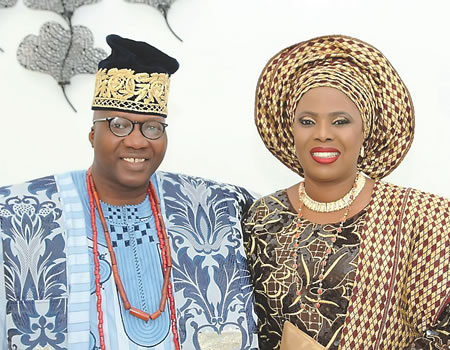Mr Yinka Fasuyi and his wife, Olubisi, are to be invested as the Asiwaju and the Yeye Asiwaju of Ijeshaland respectively today by the Owa Obokun of Ijeshaland, Oba Adekunle Aromolaran. Fasuyi, who is the Chief Executive Officer of Supreme Management Training and Consultancy Services, as well as President, Ibadan Business School, in this interview by SULAIMON OLANREWAJU, speaks about the turning point in his life as well as what he hopes to accomplish as the successor of the late Chief Bola Ige to the title of the Leader of the Ijesha people. Excerpts:
What are those things that happened when you were growing up that shaped you into who you are today?
We are the only Fasuyi from Ijeshaland. If you hear of any Fasuyi from Ilesha, it is the same Fasuyi. My late father, Chief Jacob Olowookere Fasuyi, was an entrepreneur of note. He worked in both Ijeshaland and Ibadan throughout his business life. He was a good exemplar of leadership to all his followers. Let me add two attestations to the background of my father. The late Owa Obokun of Ijeshaland, Oba Peter Agunlejika, was my father’s clerk in his business days and whenever he visited our house, he would tell stories of how my father contributed to shaping his life. We would not only marvel but we would also see his stories as an opportunity to learn. He told us that my father was instrumental in the development and fulfillment of his aspiration to become the paramount ruler of Ijeshaland. My father played a significant role in the nomination of the late traditional ruler. Then, several notable Ijesha businessmen who grew under my father’s tutelage would come at the end of each year, usually around Christmas, to celebrate with him and each time they visited, there were testimonies about the supports they received from my father.
That caliber of people who benefitted from my father became a big challenge to me and I decided to live a life of enterprise, dignity and philanthropy.
What was the turning point in your life?
Environment is always a great determinant of every individual’s life. The environment comes in two forms; the internal and external environment. The internal environment is the family. I have a very supportive, encouraging, prayerful wife. A critical decision that I took about 25 years ago had the support of my wife. The decision made me leave the world of certainty for the world of uncertainty. I left a situation where salary was guaranteed, where allowances were guaranteed, where my career progress was guaranteed. Walking away from all of these, many would describe it as madness. But for the support of God and the understanding of my wife, that decision was not an easy one. Quitting an oil company was not easy. When I told my wife, who constituted the major internal environment factor determinant, about the decision, I made her realise that the journey would not be easy but I needed her to support me with her prayer. I told her that it might be difficult in the beginning but she should bear with me. She told me that I had her support that I should go ahead with the decision.
We had to borrow money to start the business and we agreed on where to borrow the money. When I was resigning, only three people knew before my resignation letter was drawn. The first person was my wife, the second person was the one I borrowed money from and the third person was me.
The guiding principle in my decision to resign my appointment with the oil company was the remembrance of the words of Winston Churchill that ‘a pessimist sees difficulty in every opportunity but an optimist sees opportunity in every difficulty.’
In the external environment of Nigeria that I was then, I saw that the few training and development programmes I had attended could be carried out in a better way than they were being done then. That was a factor. The second was my exposure in the course of my MBA programme. The two factors propelled me into deciding that I did not have to wait until I clocked 55 years, which was the retiring age at the time, to do the things that I needed to do. So, the combination of the internal and external environments were those things that made me start, they served as the turning point in my life.
You said you wanted to live a life of dignity and philanthropy, how far have you gone in achieving that?
In terms of dignity, I think I have been able to show that to the people we have worked together in the two organisations that I have been privileged to lead — Supreme Management Training and Consultancy Services and The Ibadan Business School.
In the area of philanthropy, before the establishment of Yinka Fasuyi Foundation, I was always a rallying point for family and friends and also for associations and the society. The difference in the implementation approach is the fact that I have kept many of these away from the public glare. When you assist one, you will like to keep it to yourself. Through silent philanthropy, I have been able to provide succour to many homes, businesses and organisations. When I clocked 60 last year, I indicated that I would like to devote the better part of the rest of my life to supporting educational causes. For instance, in Ijeshaland, we have lined up a couple of programmes and projects that will be of tremendous benefit to people in that part of our country. One is in the area of education. The performance of many of our students in secondary schools is not too encouraging. The government alone cannot do everything. We, as stakeholders, must complement the efforts of the government. The Foundation intends to organise extramural classes for students in SS2 and SS3 for English and Mathematics, which are compulsory subjects, as a way of enhancing their performances in WASCCE and NECO. We are going to start that so that they can measure the impact by 2017 results.
Also, we know that the world of today and the world of the future are premised on ICT. We are also putting up the ICT centre where we will be able to train our youths on ICT.
The Foundation also has plans for our informal sector. From 1992 to 1996, my firm, Supreme Management Training and Consultancy Services, was the national consultancy firm engaged by the UNDP to provide capacity building programmes for the informal sector across the country so that they operators of micro businesses, which constitute a large segment of our economy, can manage their businesses in a way to generate more income for the family. With an increased income, they would be able to take care of their educational, health and other social needs of the projects that Yinka Fasuyi Foundation intends to prosecute and sponsor single handedly.
Why do you want to become the Asiwaju of Ijeshaland?
That is a very good question. Asiwaju of Ijeshaland is not a position that one can apply for. His Royal Majesty, the Owaobokun Adimula and the paramount ruler of Ijeshaland, Oba Gabriel Adekunle Aromolaran II, in his wisdom, has nominated me to become the Asiwaju of Ijeshaland and in a similar vein, nominated my wife, Dr (Mrs) Olubisi Fasuyi, as the Yeye Asiwaju of Ijesahland.
The position of the Asiwaju of Ijeshaland is for service. It is like what others will call the lead servant. Any attempt to see it beyond that will create a serious misconception for you the beneficiary and for those you will be serving. This position, the way I see it, is to support our Kabiyesi in galvanizing and mobilising all Ijesha sons and daughters and well wishers of Ijeshas to identify with us in prosecuting all our identified developmental agenda that will continually promote the cause of Ijeshaland.
The Kabiyesi, I believe, recognises my capacity to complement his effort at drawing Ijeshas from all the various communities that constitute Ijeshaland to unite, to collectively identify our needs; to champion the actualisation of any course of development that we believe in. In the past, there was this misconception that the government could do everything. Today, we know that the way individual gets broke, government can also be broke. The way the individual manages his limited resources, government also manages. So, we know that we have to get ourselves together to get things done for us.
One of the key virtues of Ijeshas anywhere you find them is that they are very enterprising, very industrious and rationally ambitious. These are the stuffs we are made of. Name any profession, you find Ijeshas at the top. These attributes that are God-endowed, how do we galvanize them and mobilise our people? This is what the office of the Asiwaju represents, in supporting and assisting the Kabiyesi, who is the head of Ijeshaland, in getting that aspiration fulfilled.
How do you see the business environment in Nigeria?
We are going through a self-inflicted recession. In any system, even at the family level, when the family consumes more than its income, it is bound to run into problem. So, my take is this: if you don’t produce the bulk of your consumption, you are living on a borrowed time. Let’s go back to the basics. What are our basic needs? Food, shelter and clothing. Today, let’s start from food. A society that cannot feed its citizens is not worthy of being called a society. The Nigerian society is still importing $6 million worth of rice every day. I have just mentioned rice. How come our taste is for foreign things? I just returned from the United States and Europe. In the morning, we were served continental breakfast, which consists of chips, cheese, potatoes, bread and all of that. What they claim to be continental excludes the African foods. Our foods are not international and we are part of the international community. I don’t have any problem with going there and being forced to eat what they serve there. When the Europeans, American and the Chinese visit Nigeria at our state houses and our five-star hotels, how often are they served pap and akara? How often are they served tuwo, pounded yam and eba? How often are they served fura de nunu? Our own foods are not globally competitive, which is wrong.
We are the eighth largest producer of crude oil and we are the only country that exports crude and imports the finished products. Look at the pressure on our currency. Our reserve today is low because of our importation of petroleum products. So, can you imagine we have not been refining at optimal level over the years? Nigeria, at 56, we don’t have our own vehicles. Some 30 years ago, when Volkswagen was in vogue, we had an assembling plant. Some of the little spare parts were already being produced here, but today all of them have closed down. So, not until we produce what we consume can we call ourselves a nation. It is then we can now benefit from international trade; it is then that our foreign reserve will be buoyant; it is then that our currency can regain its value and the quality of lives of Nigeria can be better. As it is now, we need to change our taste. Our foreign-oriented taste and value need to change. If we achieve that, it will reengineer our economic development.
WATCH TOP VIDEOS FROM NIGERIAN TRIBUNE TV
- Relationship Hangout: Public vs Private Proposals – Which Truly Wins in Love?
- “No” Is a Complete Sentence: Why You Should Stop Feeling Guilty
- Relationship Hangout: Friendship Talk 2025 – How to Be a Good Friend & Big Questions on Friendship
- Police Overpower Armed Robbers in Ibadan After Fierce Struggle






